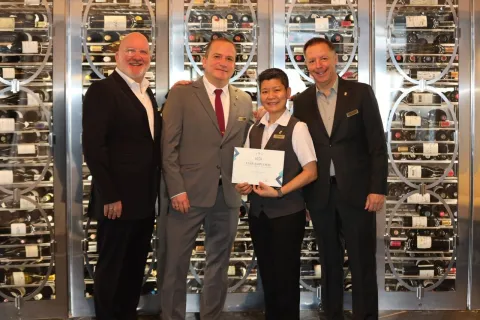
Cruise ships have workers from up to 70 countries working on each vessel at a time. This means that we're used to work with people from different culture, and thus means, we all have an international mindset. We have to work and live with people from very different backgrounds, and in doing so, we learn about their cultures and ways of doing things and become more open in general. This flows into every aspect of life and work attitudes. Everyone on the ship works peacefully and closely together to achieve common goals.
Benefit: This means they're more interested and invested in news from around the world, care about world issues, and gain insights from each other's cultures.
They get along with everyone: As well as working with people from everywhere, they have to socialize and live with them. I have seen crew members share a cabin with someone from a country that their country has been – or even still is – at war or in a political situation. The crew bar is where most of the socializing happens, and with a huge mix of nationalities, everyone shares their culture, music, dancing, jokes, and games. This means ship people get along with everyone.
Benefit: This means you know they'll be great, friendly co-workers who will help be the team's social gel and find something they like in everyone.
Loyalty: Crew works in close-knit teams for their departments as well as the team of the ship, the cruise line, and the community of cruise ships in general. They are literally in the same boat as each other. Their original families and friends aren't there, so they form strong bonds quickly with their workmates and feel firmly part of their team. This creates loyalty. The crew looks after the crew. In any situation, there's an unwritten rule to look after each other, and they do. They take this attitude into every other role.
Benefit: This means you know you'll be hiring someone very loyal who if you treat them well, will work their tails off for you and stay loyal to you for a long time.
Language skills: Crew members are from all over the world. The crew from non-native English-speaking countries already speak their language and English, and maybe even more. But living on ships, even native English speakers are inspired to speak a second or third language after having good friends or dating people whose first language isn't English.
Benefit: This means that if you have a crew member applicant, they likely speak another language, which is always helpful in every job, no matter the role or industry.
Gratefulness and appreciation: Crew members are away from home long. Away from friends, family, and loved ones, and usually work long hours and rarely have a day off. They have to abide by strict rules, and while they overall love having the job for whatever their primary motivation is, be it travel money or career enhancement, they have lots of tough days too. This means they appreciate little kindness shown to them. Being nominated for employee of the month, being singled out for a job well done in a meeting, kind words, an ice cream social in the crew mess, a free beer at a crew party, a team pizza night, extra time off in port, a little gift at Christmas time, all mean a lot.
Benefit: This means if you hire a former crew member, they will appreciate any nice little things you do for them. They'll be very grateful for being appreciated.
Good attitude to working long or extra hours: Crew members don't know what a weekend is. They're used to working possibly seven days a week and may be working 10 or 12 hours a day. This doesn't mean asking them to do this on land is OK. One of the main reasons crew leave working on ships for land is to have a regular workday schedule. But this means that if you need them to work late or on the weekend for something important, they understand that important things need extra attention, and they'll help without complaining. The phrase "that's not my job" is not in their vocabulary.
Benefit: This means they will always be there when you need extra help, with a good attitude, and get things done.
Leadership skills: Everyone who works on a ship, no matter the role, has a part to play in the overall running of the vessel. Many people work in leadership roles and are in charge of their teams. Everyone has an emergency function. Everyone participates in the mandatory safety drills for guests at the start of every cruise. Everyone takes part in the (usually weekly) crew training drills and exercises. Many more people are leaders in their safety roles. Safety is paramount onboard cruise ships, so the crew is thoroughly and routinely trained. This means most people build on their leadership skills during this training, even outside their regular job. There is a lot of competition to get a job on a ship, and it takes a certain type of toughness and personality to even apply for a position on the other side of the world away from everyone you know – and then go there to start your new world.
Benefit: This means anyone who has worked on a ship has a level of confidence, toughness, and leadership quality about them, so you know they'll rise to whatever task you give them.
Resourcefulness: Crew members are very resourceful. They're used to being stuck onboard for days - or even weeks - longer than planned. They have reached ships with their luggage still in some airports. They spend months in countries where they aren't used to the products, shops or they just can't find the practical things they need. They don't have much good, reliable internet, Netflix, phone signal etc. This means they get resourceful. They share resources onboard and swap things to help each other. And the things they can do with a bowl of instant ramen.
Benefit: They will be OK with having everything exactly how they might like it, or it's been before. They'll just get along with whatever they have and make the most of everything.
A sunny disposition: Crew members are used to being in front of customers from leaving their bedroom (cabin) until they return there at night. They keep a cheerful character throughout the day, even when they're tired or having a tough time at home, with co-workers, or in a relationship. They know more than most how to stay in the work zone and stay upbeat and cheery even if they aren't always genuinely feeling it.
Benefit: You know the crew won't bring outside issues or problems into their job, and you can rely on them to be cheerful and professional.
The hardest-working attitude: The most important trait that crew members bring to any role is that they're the most hard-working people you'll ever meet or employ. They don't tire. They don't complain. They get the job done. You never need to worry about a poor or lazy attitude or having to chase them up on anything. Doing their work well is what they do.
Benefit: They're the hardest-working employees you'll ever have.
In Conclusion
Cruise ship crew are some of the best workers you could hope to employ. Their skill set, resilience, and overall attitude will make them a great addition to any team. Even old salty sea dogs will happily learn new tricks.
To employers, please check out their transferable skills; your next hire could be the best you ever made.
To crew members, good luck! You've got this contract; keep working hard and make your families back home proud.
For the business owners, one thing is for sure. If you are looking for a loyal, hard-working, outgoing, committed, and dedicated crew member, hire a former seaman. That will be the best business decision you have ever made!
Crew Insights
Articles and experiences shared by crew members working on cruise ship. Find out more about ship life at sea together with tips and advices for first time crew members and cruise oldtimers.












